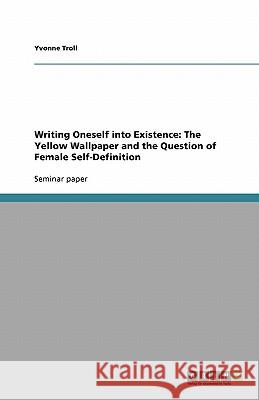Writing Oneself into Existence : The Yellow Wallpaper and the Question of Female Self-Definition » książka
Writing Oneself into Existence : The Yellow Wallpaper and the Question of Female Self-Definition
ISBN-13: 9783640309634 / Angielski / Miękka / 2009 / 40 str.
Writing Oneself into Existence : The Yellow Wallpaper and the Question of Female Self-Definition
ISBN-13: 9783640309634 / Angielski / Miękka / 2009 / 40 str.
(netto: 152,08 VAT: 5%)
Najniższa cena z 30 dni: 149,68 zł
ok. 13-18 dni roboczych.
Darmowa dostawa!
Seminar paper from the year 2005 in the subject English Language and Literature Studies - Literature, grade: 1,0, University of Freiburg (Englisches Seminar), course: American Women Writers, 15 entries in the bibliography, language: English, abstract: "The Yellow Wallpaper" is an exceptional piece of art by an author who, living at a time that put a heavy weight of social conventions and expectations on women, was trying to undermine these restrictions through sharp analysis of the man-made society surrounding and tying women. Charlotte Perkins Gilman wrote a number of short stories, novels and poems all dealing with the situation of women as wives, mothers, workers, artists and individuals. But although the subjects of all her works are critical and particularly provoking for the time, not flattering Gilman with a lot of fame, "The Yellow Wallpaper" is both in style and draft distinctive, more subtle and effective, and it unites her various points of social criticism to a strong attack on a system that ruins female sanity and suppresses female creativity. By the time of its first publication in 1892 it was read as a horror tale, since it contains elements typical for stories in the tradition of Poe, and because of its terrifying impact on the reader. To me a complete misunderstanding of the textual depth and message. But nevertheless the famous sentence in the letter of Horace E. Scudder, the editor of the Atlantic Monthly, rejecting the publication in his magazine, shows that there must have been a presentiment of the accusing content and real power of the story. "I could not forgive myself if I made others as miserable as I have made myself " The ignorance from the male-dominated audience of Gilman's time made the publication difficult and even after it was published, it remained widely unnoticed and unprinted until it was reinterpreted by Elaine R. Hedges from a feminist angle in 1973 during the rise of feminist literary criticism. With Hedges interpretatio











